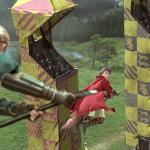Harry Potter and the Battle Against Bigotry

Sure, Harry Potter destroyed the evil Lord Voldemort. But, aside from making lots of money for book publishers and film studio/theme-park conglomerates, what has the wizard done for us lately?
In fact, he has been helping to reduce prejudice.
That's the conclusion of research just published in the Journal of Applied Social Psychology. It finds that, among young people, reading J.K. Rowling's book series - and, crucially, identifying with the lead character-can reduce bias toward stigmatized minority groups.
In two different studies, young Italians took note of "the positive attitudes and behaviors of Harry Potter toward stigmatized fantastic groups," and this fantasy-world interaction apparently influenced their real-world attitudes.
Kids (with the help of a discussion leader for the youngest) were able to make the imaginative leap between Harry's defense of "mudbloods" and the unfairness of bigotry toward immigrants and gays.
According to a research team led by Loris Vezzali of the University of Modena and Reggio Emilia, this suggests "reading the novels can potentially tackle actual prejudice reduction."
Those who read and discussed Potter passages about prejudices showed "improved attitudes towards immigrants." The researchers caution, however, that this welcome reaction only occurred among those who identified with the title character.
Bigotry, the researchers note, is a continuing theme in the series of phenomenally popular young-adult novels. Voldemort, who represents pure evil, makes arguments that have "rather obvious" parallels with Nazism, they write, noting that he believes all power should reside in "pure-blood" witches and wizards, as opposed to those born of one magical parent and one non-magical "muggle."
In addition, Harry and his friends interact with various sub-human species such as elves and goblins, who regularly complain about being forced into subservient roles, not unlike blacks in apartheid South Africa. Harry "tries to understand them and appreciate their difficulties," the researchers write.
The parallels may be obvious to adults, but do they connect with kids? The researchers conducted several studies to find out. The first featured 34 Italian fifth graders, who began by filling out a questionnaire assessing their attitudes toward immigrants.
For six weeks, they met weekly with a researcher in groups of five or six to discuss selected passages from the Harry Potter books. Half of the kids read, and talked about, sections that dealt directly with prejudice; the others focused on sections that discussed unrelated topics.
Afterwards, they again answered questions about their attitudes about immigrants, listed how many Harry Potter books or films they had seen, and revealed the extent to which they wanted to be like Harry.
The results: Those who read and discussed Potter passages about prejudices showed "improved attitudes towards immigrants." The researchers caution, however, that this welcome reaction only occurred among those who identified with the title character.
The second study featured 117 Italian high school students. They were asked how many of the books they had read; whether they felt an emotional kinship with Harry (or, alternatively, Voldemort); and, in what they were told was a separate study, expressed their attitudes toward homosexuals.
The researchers found those who had read more of the books also had a more positive attitude toward gay people-but, again, only if they felt a personal connection to the title character.
A final study used a different age group (college students) in a different country (England) and assessed attitudes toward a different minority group (refugees). The results were also a bit different, as identification with Harry was not linked with lower levels of prejudice. (The researchers point out that Harry is less likely to be an effective role model to this older audience.)
However, as they looked more deeply, the researchers found the same dynamic at play; here, the key variable was the extent to which participants identified (or failed to identify) with Voldemort. They also discovered the same likely mechanism behind the prejudice reduction: The books' ability to prompt readers to view society from the viewpoint of a disparaged minority.
"Harry Potter book reading was positively associated with perspective taking toward refugees only among those less identified with Voldemort," they report. "Perspective taking, in turn, was associated with improved attitudes toward refugees."
The study is consistent with research we reported on earlier this year, which found that reading literary fiction can reduce racism by helping readers identify with characters from diverse backgrounds. (For that reason, these researchers took overall book reading into account when analyzing their results; they found the Harry Potter books had an impact beyond that of reading in general.)
Of course, people who grow up with biased beliefs aren't likely to read the type of story used in the earlier study, which focuses on a Muslim woman living in New York. But they may very well read a fantasy story like the Harry Potter novels, where such messages are effectively embedded in the middle of a gripping, imaginative storyline.
Perhaps arguments for open-mindedness are most effectively delivered underneath an invisibility cloak.
[Pacific Standard staff writer Tom Jacobs is a veteran journalist with more than 20 years experience at daily newspapers. He has served as a staff writer for The Los Angeles Daily News and the Santa Barbara News-Press. His work has also appeared in The Los Angeles Times, Chicago Tribune, and Ventura County Star.]
